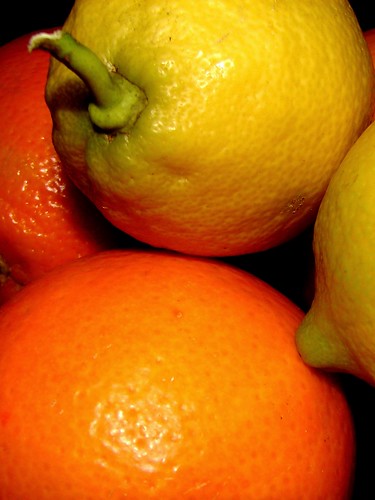7.07.2008
Juice Your Brain with Something Besides O.J.
>


Oranges and Lemons are often regarded as the premiere sources of Vitamin C, which has a reputation as a wonder substance. (See the Benefits of Vitamin C, below).
But, did you know that there is a common plant material that contains up to 5 times the concentration of vitamin C as lemons?

This super green is nothing less than fresh pine needles, particularly the new growth. In Scandinavia, about 1 cup of fresh pine needles are plucked from the trees and heated (not boiled) for 20 minutes in a pint of water. The resulting infusion contains a very high concentration of vitamin C and also vitamin A, as well as antioxidants. Timing is everything: boil it for more than 20 minutes and the broth may become too acidic, with sap imparting a slight aftertaste of turpentine. It was used as a tonic throughout the winter and as a treatment for colds since ancient times.
Benefits:
Vitamin C is the most popular single vitamin. Besides taking it to treat colds, people pop vitamin C capsules hoping that it will cure numerous ailments. There is now scientific evidence to support some of that hope.
Scientifically controlled studies using vitamin C for colds show that it can reduce the severity of cold symptoms, acting as a natural antihistamine. The vitamin may be useful for allergy control for the same reason: It may reduce histamine levels. By giving the immune system one of the important nutrients it needs, extra vitamin C can often shorten the duration of the cold as well. However, studies have been unable to prove that megadoses of the vitamin can actually prevent the common cold.
Vitamin C rich diets benefit your well-being and can aid in the prevention of cancer and other illnesses.
As an important factor in collagen production, vitamin C is useful in wound healing of all types. From cuts and broken bones to burns and recovery from surgical wounds, vitamin C taken orally helps wounds to heal faster and better. Applied topically, vitamin C may protect the skin from free radical damage after exposure to ultraviolet (UV) rays.
Vitamin C makes the headlines when it comes to cancer prevention. Its antioxidant properties protect cells and their DNA from damage and mutation. It supports the body's immune system, the first line of defense against cancer, and prevents certain cancer-causing compounds from forming in the body. Vitamin C reduces the risk of getting almost all types of cancer. It appears that this nutrient doesn't directly attack cancer that has already occurred, but it helps keep the immune system nourished, enabling it to battle the cancer.
As an antioxidant, vitamin C helps to prevent cataracts -- the clouding of the lens of the eye that can lead to blindness in older adults. The lens needs a lot of vitamin C to counteract all the free radicals that form as a result of sunlight on the eye. Vitamin C is concentrated in the lens. When there's plenty of this vitamin floating through your system, it's easy for the body to pull it out of your blood and put it into the lens, protecting it from damage. It's possible that 1,000 mg per day of vitamin C might stop cataracts in their tracks and possibly improve vision.
As with the other antioxidants, vitamin C helps to prevent heart disease by preventing free radicals from damaging artery walls, which could lead to plaque formation. This nutrient also keeps cholesterol in the bloodstream from oxidizing, another early step in the progression towards heart disease and stroke. Vitamin C may help people who have marginal vitamin C status to obtain favorable blood cholesterol levels. High blood pressure may also improve in the presence of this wonder vitamin. All these factors combined make vitamin C an inexpensive and easy way to lower one's risk of heart disease and strokes.
Labels: c, infusion, needles, pine, scandinavia, trees, vitamin

